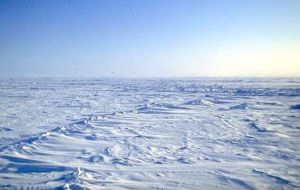MercoPress. South Atlantic News Agency
Antarctica ice shelves melting faster than estimated

Antarctica's ice shelves are melting more rapidly than previously known because of climate change, according to a new US Geological Survey report prepared in close collaboration with the British Antarctic Survey, the Scott Polar Research Institute and Germany's Bundesamt fűr Kartographie und Geodäsie.
The Wilkins Ice Shelf, a huge iceberg more than 100 kilometres across, is about to break off from the Antarctic continent and float free, possibly as a result of global warming, two German scientists said this week.
Rifts have developed in the narrow “ice bridge,” which is the last link between the shelf and the Antarctic Peninsula, reported the European Space Agency (ESA), quoting scientists Angelika Humbert and Matthias Braun, who have been observing the ice using satellite photos.
Humbert and Braun have been watching changes in radar images of the ice taken by an ESA satellite, Envisat. Two big chunks of the shelf broke away last year, leaving the ice bridge only 900 metres wide at its narrowest point.
“In the past months, we have observed the ice bridge deforming and its narrowest location acting as a kind of hinge,” Humbert said.
“During the last year the ice shelf has lost about 1,800 square kilometres or about 14% of its size.”
Antarctica's ice sheet was formed by thousands of years of accumulated and compacted snow. Along the coast the ice gradually floats out onto the sea, forming massive ledges known as ice shelves.
Seven such ice shelves have retreated and disintegrated in the past 20 years. The Wilkins Shelf was stable for most of last century before it began retreating in the 1990s. Scientists are investigating whether unusual warming in the past 50 years is to blame.
The separation of the ice shelf from its land anchors, Charcot Island and Latady Island, would not raise world sea levels because the ice is already floating on the Antarctic Ocean.
Humbert works at the Institute of Geophysics of Muenster University and Braun at the Centre for Remote Sensing, University of Bonn.




Top Comments
Disclaimer & comment rulesCommenting for this story is now closed.
If you have a Facebook account, become a fan and comment on our Facebook Page!